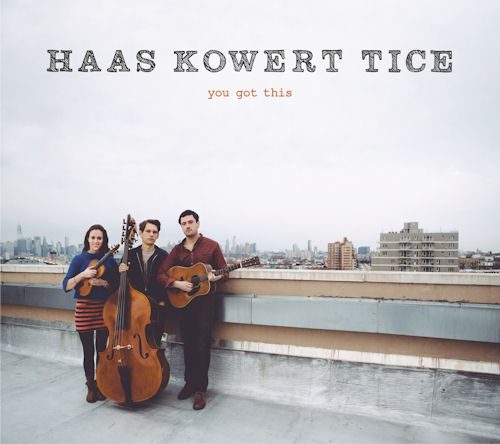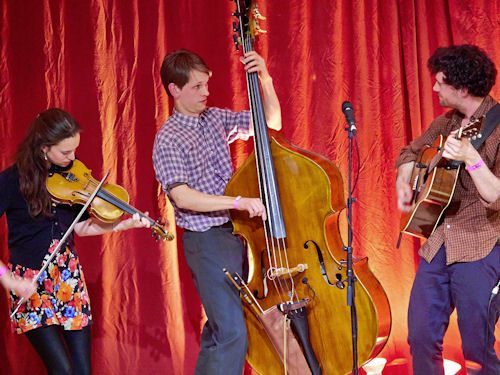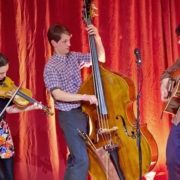HAAS KOWERT TICE – YOU GOT THIS
TITLE: YOU GOT THIS
ARTIST: HAAS KOWERT TICE
LABEL: NONE
RELEASE DATE: JULY 2014
 Brittany Haas, Paul Kowert and Jordan Tice are friends who, after meeting at various string band festivals in their youth, represent a new wave within the American string community. Bursting with their combined influences, You Got This is less like newgrass music and more reminiscent of works for a contemporary music ensemble. Released in July of 2014, the nine original compositions are densely packed with contrapuntal exchanges, changing meters and extended harmonies. The result: fiddle, guitar and bass at their most innovative.
Brittany Haas, Paul Kowert and Jordan Tice are friends who, after meeting at various string band festivals in their youth, represent a new wave within the American string community. Bursting with their combined influences, You Got This is less like newgrass music and more reminiscent of works for a contemporary music ensemble. Released in July of 2014, the nine original compositions are densely packed with contrapuntal exchanges, changing meters and extended harmonies. The result: fiddle, guitar and bass at their most innovative.
The album plays like a live performance with virtuosic playing and acrobatic orchestration in the forefront. As a trio, You Got This is their debut, but individually the young members already boast the extensive resumes to match their abilities. Paul Kowert, bassist and member of the Punch Brothers, is equally adept with his fingers as he is with a bow, highlighting his training at the Curtis Institute of Music. Brittany Haas, playing five string fiddle, carries the influences of Bruce Molsky and Darol Anger and lithely transitions between Appalachian down bowing, silky long bowing and rhythmic chops. Bluegrass runs in the blood of Jordan Tice, graduate of Towson University music school and lead composer of the trio. And, when not leading the melodies with his flatpicking abilities, he acts as the harmonic adhesive between the bass and fiddle.
A track that defines much of the group’s aesthetic is Grandpa’s Cheesebarn. To begin, Tice flatpicks an unusual modal theme that condenses rhythmically like a ball bouncing high before it is pulled by gravity into a frantic state of dribbling. The shortening rhythmic structure is not unlike those used in Indian ragas and is just one of the various influences layered into the song. Each player takes a turn with the melody, infusing it with his or her own idiosyncrasies before ending the piece with a thundering unison refrain.
As I said, the compositions are dense, but not without purpose. The complexity of the musical language allows them to color listeners with subtler emotions. In Better Off, Haas substitutes a mandolin for her fiddle and doubles Tice’s guitar, picking out ascending arpeggios with neo-baroque cadences. It is mystical and a bit dewy-eyed at first, but the B section submerges the song into darker more capricious waters, demonstrating a successful attempt by the group to broaden the expressive range of the folk vernacular.
 With just three musicians playing at a time, each instrument is exposed. Haas Kowert Tice seems to relish the opportunity to widen the dynamic range; they liberally use repetitive rhythmic gestures, startling key changes, and melodic imitation. In The Switchback Games, each instrument states the theme as if playing a musical game of hot potato, matching each other’s dexterity and inventiveness. With instrumental ebb and flow, the texture never feels thin and the structure never predictable.
With just three musicians playing at a time, each instrument is exposed. Haas Kowert Tice seems to relish the opportunity to widen the dynamic range; they liberally use repetitive rhythmic gestures, startling key changes, and melodic imitation. In The Switchback Games, each instrument states the theme as if playing a musical game of hot potato, matching each other’s dexterity and inventiveness. With instrumental ebb and flow, the texture never feels thin and the structure never predictable.
In no uncertain terms, You Got This requires attentive listening skills. It is an intellectual musical effort that although at times evokes familiar styles – old-time breakdowns, world music, jazz ballads – is never one thing at any given time. It exists purely as a glimpse into the mindset of young prodigies who are branching off of their folk roots in order to synthesize the music of a global village.
Folk music is anything but erudite or preconceived. You Got This is laden down with both. It is beside the point, however, to pen Haas Kowert Tice down as “folk.” The compositions are honest, natural and carry the combined weight of their musical experiences, which, seen from a broad perspective, is the goal of all modern musical groups.
Jonathan Shifflett is a recent graduate of USC’s classical guitar program, who has since seen the light and traded the guitar for a banjo. When not tracking down train car murals or searching for hobo hieroglyphics, he enjoys pretending to play the fiddle and thinking about the folk music world at large.













